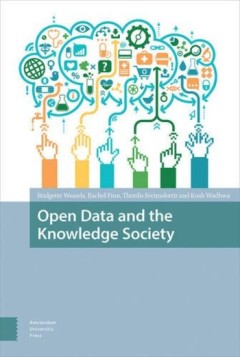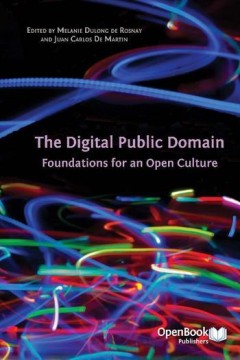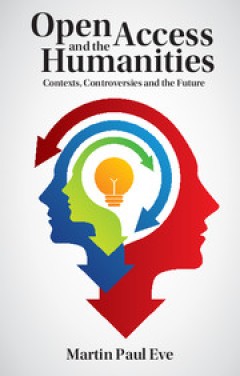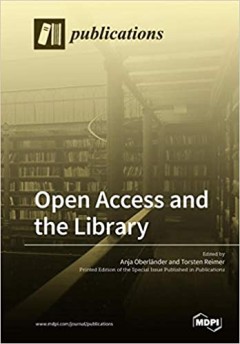Filter by

The globalization of knowledge in history : based on the 97th Dahlem Workshop
Today scientific, technological and cultural knowledge is shared worldwide. The extent to which globalized knowledge also existed in the past is an open question and, moreover, a question that is important for understanding present processes of globalization. This book, the first volume of the series "Studies" of the "Max Planck Research Library for the History and Development of Knowledge," th…
- Edition
- -
- ISBN/ISSN
- 9783844222388
- Collation
- 866p. : ill.
- Series Title
- -
- Call Number
- 001.01 GLO g

Open data and the knowledge society
This book considers the role of the open data movement in fostering transformation toward a 'knowledge society'.
- Edition
- -
- ISBN/ISSN
- 9789462980181
- Collation
- 203p. : ill.
- Series Title
- -
- Call Number
- 070.4 WES o

Perspectives for the Next Generation of Virus Research: Spearheading the Use …
Infectious diseases are associated with approximately 20% of global mortality, with viral diseases causing about one third of these deaths. Besides newly emerging and re-emerging viral infections will continue to pose a threat to human survival globally. In this case scientific advances have greatly been increased to defend against those pathogens. For example, rapid genomic sequencing, proteom…
- Edition
- -
- ISBN/ISSN
- 9782889452156
- Collation
- 192p.: ill.
- Series Title
- -
- Call Number
- 616.01 YAM p

The digital public domain : foundations for an open culture
Digital technology has made culture more accessible than ever before. Texts, audio, pictures and video can easily be produced, disseminated, used and remixed using devices that are increasingly user-friendly and affordable. However, along with this technological democratization comes a paradoxical flipside: the norms regulating culture's use —copyright and related rights —have become increa…
- Edition
- -
- ISBN/ISSN
- 9781906924478
- Collation
- xxv, 220p. : ill.
- Series Title
- -
- Call Number
- 346.048 DIG d

Safe to be open : study on the protection of research data and recommendation…
This study addresses the most important legal issues when implementing an open access e-infrastructure for research data. It examines the legal requirements for different kinds of usage of research data in an open access infrastructure, such as OpenAIREplus, which links them to publications. The existing legal framework regarding potentially relevant intellectual property (IP) rights is analyse…
- Edition
- -
- ISBN/ISSN
- 9783863951474
- Collation
- 165p. : ill.
- Series Title
- -
- Call Number
- 025.52 SAF s

Implementing open access mandates in Europe - OpenAIRE study on the developme…
The implementation of open access policies in Europe is a socio-technical undertaking whereby a wide range of stakeholders work together to bring out the benefits of open access for European and global research. This work provides a unique overview of national awareness of open access in 32 European countries involving all EU member states and in addition, Norway, Iceland, Croatia, Switzerland …
- Edition
- -
- ISBN/ISSN
- 9783863950958
- Collation
- 175p. : ill.
- Series Title
- -
- Call Number
- 070.57973094 SCH i

Critical perspectives on cultural memory and heritage
Critical Perspectives on Cultural Memory and Heritage focuses on the importance of memory and heritage for individual and group identity, and for their sense of belonging. It aims to expose the motives and discourses related to the destruction of memory and heritage during times of war, terror, sectarian conflict and through capitalist policies. It is within these affected spheres of cultural h…
- Edition
- -
- ISBN/ISSN
- 9781787354845
- Collation
- XVIII, 315 p.
- Series Title
- -
- Call Number
- 949.601 APA c

Open access and the humanities : contexts, controversies and the future
If you work in a university, you are almost certain to have heard the term 'open access' in the past couple of years. You may also have heard either that it is the utopian answer to all the problems of research dissemination or perhaps that it marks the beginning of an apocalyptic new era of 'pay-to-say' publishing. In this book, Martin Paul Eve sets out the histories, contexts and controversie…
- Edition
- -
- ISBN/ISSN
- 9781107484016
- Collation
- xv, 209p. : ill.
- Series Title
- -
- Call Number
- 001.30285 EVE o

Open access and the library
Libraries are places of learning and knowledge creation. Over the last two decades, digital technology—and the changes that came with it—have accelerated this transformation to a point where evolution starts to become a revolution.The wider Open Science movement, and Open Access in particular, is one of these changes and is already having a profound impact. Under the subscription model, the…
- Edition
- -
- ISBN/ISSN
- 9783038977407
- Collation
- vii, 131p. : ill.
- Series Title
- -
- Call Number
- 026.3 OPE o

The deliverance of open access books : examining usage and dissemination
In many scholarly disciplines, books - not articles - are the norm. As print runs become smaller, the question arises whether publishing monographs in open access helps to make their contents globally accessible. To answer this question, the results of multiple studies on the usage of open access books are presented. The research focuses on three areas: economic viability; optimization of open …
- Edition
- -
- ISBN/ISSN
- 9789085551201
- Collation
- 234p. : ill.
- Series Title
- -
- Call Number
- 002.09 SNI d
 Computer Science, Information & General Works
Computer Science, Information & General Works  Philosophy & Psychology
Philosophy & Psychology  Religion
Religion  Social Sciences
Social Sciences  Language
Language  Pure Science
Pure Science  Applied Sciences
Applied Sciences  Art & Recreation
Art & Recreation  Literature
Literature  History & Geography
History & Geography